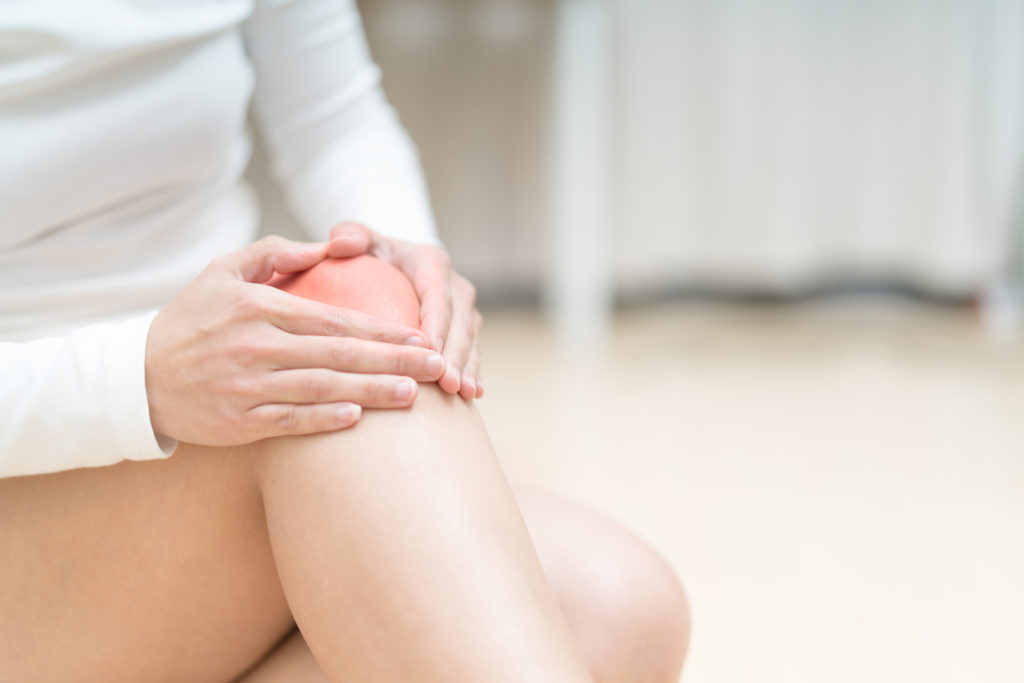Swollen Knee

What Is A Swollen Knee?
A swollen knee, also known as “water on the knee” is knee effusion, a collection of fluid in and around the knee joint. This arises due to over use, injury or disease. Common injuries involve torn ligaments (e.g. ACL tear), cartilage damage (meniscus tear), or bone fractures.
Symptoms include:
- Painful joint
- Redness
- Difficulty to bear weight
- Decreased flexibility
What Causes A Swollen Knee?
The conditions that most commonly cause knee swelling include:
- Injury: harm to the bones, ligaments, tendons, articular cartilage, meniscus and bursae of the knee can lead to pain and swelling. Blood can spread into the knee joint causing significant bruising, swelling, heat and stiffness.
- Osteoarthritis: mass production of joint fluid from cartilage degeneration can make the knee swell and cause pain.
- Rheumatoid Arthritis: an autoimmune disease contributing to knee swelling, redness, pain, tenderness, and swelling. Symptoms occur on both sides of the body. Other joints may be affected as well.
- Juvenile Rheumatoid Arthritis: Aching, swollen joints accompanied by fever or rash, leading to a limp or awkward gait.
- Gout: painful joint due to piling up of microscopic uric acid crystals
- Pseudogout: Sudden swelling and severe pain in the knee from calcium pyrophosphate crystals amassing in the joint.
- Bursitis: thin, fluid-filled sacs, protecting the joints can fill with excess fluid from inflammation leading to swelling or “water on the knee”. When a bursa is infected it can fill with pus, leading to a red and hot, swollen knee. Medical treatment should be immediate.
- Baker’s Cyst: cyst at the back of the knee causing swelling. Treatment consists of rest, ice, compression and elevation of the leg.
- Osgood-Schlatter Disease: Condition of Patellar tendon inflammation seen in teens and preteens, which resolve with child growth.
- Septic Arthritis: infected knee joint with possible pus due to bacteria penetrating the lining around the knee joint leading to knee swelling, fever and severe knee pain.
- Reactive Arthritis: Inflammatory immune response due to bacterial infections (i.e. chlamydia, GI infections). This leads to pain and joint swelling.
- Tumor: rare, may be associated with night sweats, fever and weight loss.
Can Diet Help A Swollen Knee?
Since weight bearing is difficult with a swollen knee, losing excess pounds may help alleviate pain.
Certain foods have been shown to affect swollen knees when the cause is gout and inflammation. They include:
- Cherries: possess anthocyanin which helps lessen inflammation and gout symptoms
- Bananas: has an elevated level of potassium, which converts uric acid crystals into liquid, which is then excreted through urine. The vitamin C helps decrease swelling and pain.
- Ginger root: whether as a paste, boiled in hot beverage or minced into a meal, ginger root has anti-inflammatory properties.
- Apple cider vinegar: aids in relief of pain and inflammation due to its acidity. Add a teaspoon to a glass of water and drink 2-3 times each day.
- Baking soda: decreases the amount of uric acid in the body.
- Apples: have malic acid, which reduces uric acid, swelling and pain.
- Lemon juice: alkalizes the body, decreasing uric acid amounts.
What Treatment Options I Can Do On My Own?
Natural treatments for knee swelling reduction and pain relief include:
- Proper nutrition: Vitamin C-rich foods filled with antioxidants help
- Ice: apply to knee as soon as swelling occurs to decrease the amount.
- Arnica: ointment or tablet forms help cartilage, connective tissue and bone repair.
- Warm bath: Once swelling decreases, bath or moist hot towel to affected knee relieves pain.
- Massage: increases blood circulation around the knee and aids in endorphin release.
- Activated Charcoal: Make a paste of charcoal powder and water for application to the affected knee area or soak in a bath with half a cup of activated charcoal. This absorbs uric acid, which decreases the swelling of the knee and other joints produced from gout.
- Epsom salts: Soak the swollen knee in an Epsom salt and warm water mixture for pain relief and swelling reduction.
- Exercise: decreases the level of uric acid by normalizing insulin levels.
- Consumption: Avoid or reduce sugar, alcohol, soda and caffeine
What Are The Professional Treatment Options For A Swollen Knee?
Treatment of swollen knees depends on the cause of this condition.
If gout is diagnosed after uric acid crystals are seen in aspirated fluid taken from the affected knee, treatment involves medication in the form of nonsteroidal anti-inflammatory drugs (NSAIDs), colchicine and corticosteroids (e.g. prednisone).
A tear to the ligament, tendon or bone fracture may necessitate a brace, support and surgery.
Swollen knees due to infection necessitate antibiotics, withdrawal of pus and bathing the affected area.
What Should I Expect From A Swollen Knee?
Swollen knees or “water on the knee” is merely a symptom of a medical problem or imbalance. It may appear spongy. Once the cause of the swollen knee is determined, the swelling can be reduced over a short period of time once the underlying condition is treated.
Find A Healthcare Provider Now
Tagged: Back of Knee Pain, Knee, Knee Inflammation


